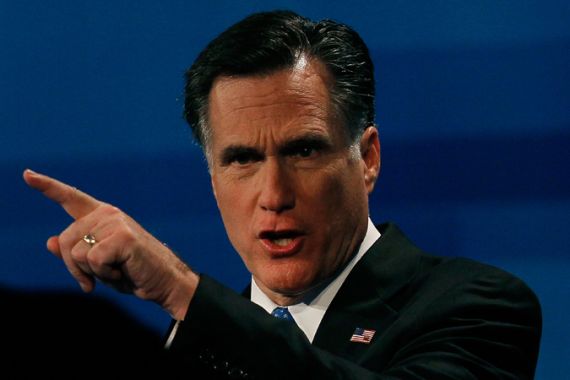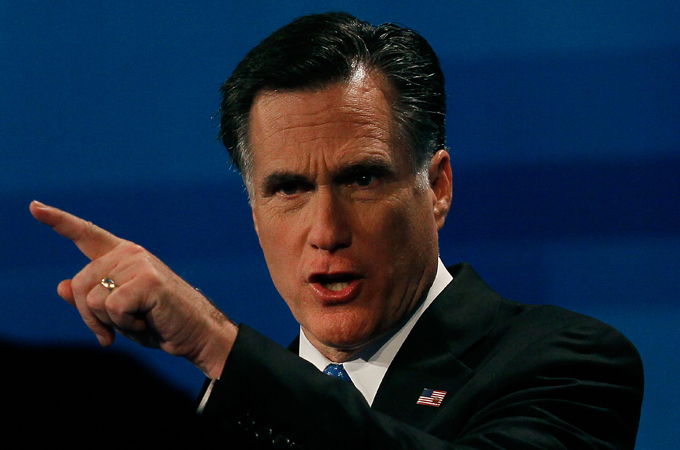Next up: Rough-and-tumble South Carolina
Romney has won two states in a row, but the next could be fraught with challenges for the front-runner.

 |
| A fractured Republican field has put Mitt Romney ahead in the polls in South Carolina [GALLO/GETTY] |
Want to know which candidate will win the Republican Party’s nomination this year?
Look to see who wins the South Carolina primary: The victor in the Palmetto State has gone on to clinch the nomination in every election year since 1980.
Candidates broadly favoured by the Republican Party’s base do not always perform well in Iowa’s low-turnout caucuses or with New Hampshire’s moderate breed of Republican.
“If you’re trying to figure out what base Republicans are thinking,” said James David Woodard, a professor of political science at Clemson University, “you’d probably get a better reading in South Carolina than you do in New Hampshire”.
Then there is South Carolina’s place on the calendar as the third state to vote. (In the US, all 50 states vote in separate contests to determine the nominees of the two major parties.) Candidates facing disappointing results in Iowa or New Hampshire (such as Minnesota congresswoman Michele Bachmann) are often winnowed out by the time South Carolina votes. Usually, one or two contenders drop out of the race immediately following the South Carolina primary, too
After the state votes on January 21, “you’ve really started to focus and fine-tune who are the two or three most likely candidates to go on,” explained Charles Bierbauer, the dean of the College of Mass Communications and Information Studies at the University of South Carolina.
What do voters want?
As in much of the rest of the country, jobs and the economy are the biggest issues in South Carolina this election season; almost one in ten South Carolinians are unemployed, which is one of the highest rates in the US.
But the economy isn’t the only thing that matters to voters. Laura Olson, a political scientist at Clemson and an expert on the role religion plays in politics, told Al Jazeera that two undercurrents dominate South Carolina politics. One is scepticism of a big federal government – against which South Carolina has often been at odds – and the other religious conservatism.
Unlike New Hampshire, South Carolina has a high percentage of evangelical Protestants – especially in the state’s north-western corner – who tend to be concerned with issues such as abortion, gun rights, same-sex marriage, and school prayer.
However, Earl Capps – who runs a blog on the state’s politics – said that South Carolina’s political mindset has changed a lot in the past few decades, especially along the coastline. “While social conservatives are still a key constituency,” Capps explained to Al Jazeera, “they’re far from the only constituency … A lot of Republicans on the coast are not enamoured with social conservatives.”
Until the 1960s, South Carolina voted overwhelmingly for Democrats, and the state Republican Party was relatively unimportant. But when the national Democratic Party began to champion civil rights issues, quondam Democrats began to shift their allegiances to the Republican Party.
Since 1964, South Carolina has voted Republican in every presidential election but one. Although Obama won the state’s Democratic primary by a large margin, he was clobbered in the general election by Arizona senator John McCain.
Today, the Tea Party’s calls for big budget cuts and a smaller federal government resonate here. It’s not surprising that Senator Jim DeMint, a Tea Party darling and one of the most conservative Republicans in the Senate, hails from South Carolina.
Who will win?
|
South Carolina Quick Facts |
South Carolina Republicans seem to be divided between supporting a candidate whom they think can beat Barack Obama in the fall (Mitt Romney), and backing someone whom they see as representing conservative values (Rick Perry, Newt Gingrich, Rick Santorum, Ron Paul).
Romney won the New Hampshire primary convincingly on January 10, garnering about 40 per cent of the vote. He also currently leads in the polling in South Carolina, although not by as great a margin. And much of South Carolina’s political establishment, such as governor Nikki Haley and treasurer Curtis Loftis Jr, back Romney.
It’s a common trope that Romney’s Mormon faith will hurt his chances here – Olson said that many Christian fundamentalists regard the Church of Latter-Day Saints (the official name of the Mormon Church) as “sort of a cult” – though there’s no way to measure how big this effect will be. As Woodward explained, “people just don’t discuss their religious convictions when you are trying to poll them anonymously on the phone”.
What about Ron Paul, who placed third in Iowa and was the runner-up in New Hampshire? South Carolina has a large number of veterans and several major military bases. On the one hand, the unorthodox Paul’s non-interventionist foreign policy could alienate South Carolinians who favour a strong military presence overseas. However, Paul – a veteran of the US Air Force himself – has raised more money from members of the military than any of his Republican opponents.
Perry, Gingrich, and Santorum are all vying to be seen as the “true conservative” in the race. Unless one or more of them drop out of the race before January 21, the three may split the vote of conservative South Carolina Republicans, enabling Romney to eke out a victory.
This is precisely what happened in the state in 2008, according to Olson. John McCain won that primary, but only by a few percentage points. Former Arkansas governor and evangelical Mike Huckabee came in second, but likely would have won if it were not for the presence of former Tennessee senator Fred Thompson, who drew 16 per cent of the vote from like-minded voters.
|
“You better be ready to rumble when you come down here to South Carolina to run for president.” – Phillip Bowers, Pickens County Republican Party chairman |
Does it matter that Perry, a Texan, and Gingrich, a Georgian, are both southerners? Phillip Bowers, the chairman of the Pickens County Republican Party, says it will help their bids – but only “a little bit”. Bowers says that Perry, who has visited Pickens County, “seemed right at home” there, and that Gingrich is “the same way”.
As for Santorum – a devout Catholic who is known for his staunch position on social issues – his warm reception in South Carolina “suggests that evangelical-Catholic relations have thawed an awful lot”, said Olson.
Santorum, who is currently supported by about one in five South Carolina Republicans, may also appeal to younger voters, too. According to Olson, younger evangelicals tend to be concerned not only with the traditional hot-button topics but with issues such as poverty as well – a topic Santorum often addresses.
Slugfest
Politics in South Carolina often gets nasty. “It’s bare-knuckles down here,” said Bowens. “You better be ready to rumble when you come down here to South Carolina to run for president.”
In 1980, Republican strategist Lee Atwater ruined Democrat Tom Turnipseed’s congressional bid in South Carolina by telling reporters that as a teenager, Turnipseed had undergone electroshock therapy for depression and had “got hooked up to jumper cables”. The lurid image stuck in voters’ minds – and Turnipseed lost.
In 2000, McCain won the New Hampshire primary, and entered South Carolina with big momentum. But some supporters of George W Bush started a whisper campaign alleging that McCain’s adopted Bangladeshi child was actually a black child whom he fathered out of wedlock, and that McCain might be mentally unstable after years as a prisoner-of-war in Vietnam (Bush denied any involvement). In response, McCain went down to defeat. Capps points out, however, that McCain also ran a strongly negative campaign against Bush in South Carolina.
Explanations for the no-holds-barred style abound. Bowers says: “We want these candidates to talk and duke it out and show us what they’re made of – because we want someone who’s a strong leader for our country.” And Woodard, who told Al Jazeera that “there’ll probably be a lot of mud thrown” in the upcoming primary, joked that the combativeness may stem from “when we fired on Fort Sumter in 1861 – we just like to fight.”
The coming week promises to offer plenty of that. Gingrich, who was hammered by ads funded by pro-Romney groups in Iowa, is out for revenge. Casino magnate Sheldon Adelson, one of the richest men in the world, donated $5m to a “Super PAC [political action committee]”, an organisation that can legally raise unlimited amounts of money from corporations, unions, and wealthy individuals.
The Super PAC in question, which supports Gingrich, has said it will spend $3.4m on TV ads in South Carolina. The ads are expected to lambast Romney for his tenure at Bain Capital, during which, the Gingrich camp claims, Romney was responsible for destroying jobs and laying off workers.
Coupled with the fact that media markets in South Carolina tend to be relatively cheap, the state’s residents “are going to be deluged with political ads”, Bierbauer predicts.
Follow Sam Bollier on Twitter: @SamBollier